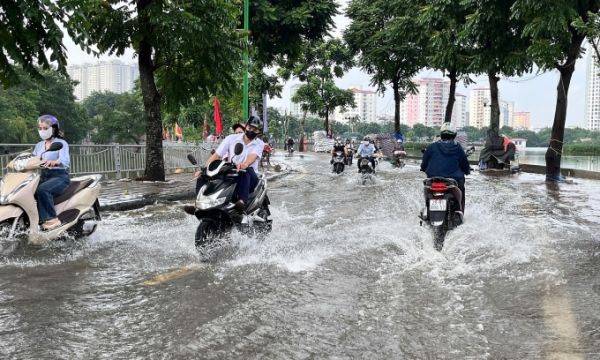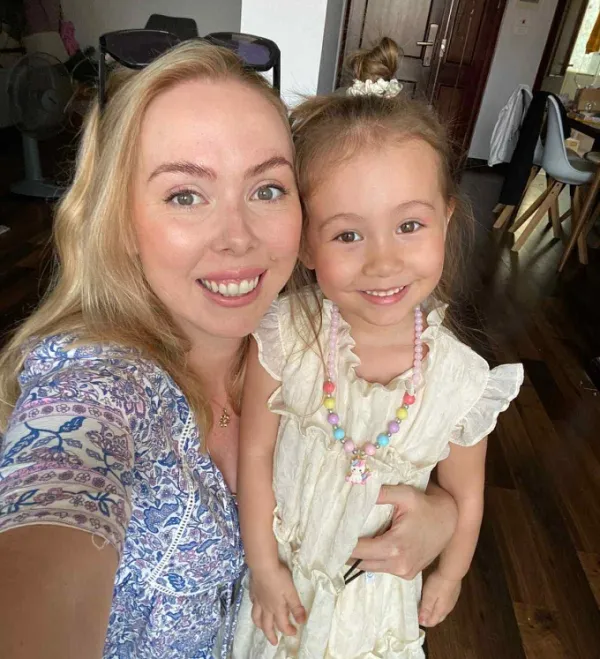
After 10 years of running his business in the My Dinh – Me Tri urban area in Hanoi, the South Korean man had grown used to empty dining rooms whenever heavy rains turned the city into a sea of water.
He said: “The rain was so heavy that no one could go out to eat. I had to let almost all of my staff leave early.”
All reservations were canceled because vehicles could not make it through the flooded streets. “We had no revenue that day,” he said. “But the hardest part was the stress of constantly worrying that water would flood into the restaurant.”
|
Park Young Weon, owner of Han Yang restaurant in the My Dinh – Me Tri urban area, Hanoi. Photo by Read/Phong Ngo |
On Tuesday, the north was battered by rainfall exceeding 300 millimeters in 24 hours in some places, schools were closed and commuters were trapped on inundated streets well into the night.
Hanoi’s My Dinh – Me Tri urban area, known as “South Korea Town” for its concentration of Korean restaurants, cafes and supermarkets and usually bustling with activity, turned into a river with traffic coming to a halt.
Park said: “The drainage system here is too poor. Heavy rain always leads to flooding, and both motorbikes and cars are stranded.”
But instead of dwelling on frustration, he focuses on supporting his staff and waiting for customers to return once the rain eases. “Running a restaurant in Hanoi, especially during the rainy season, requires you to be flexible,” he said.
|
Motorbike drivers navigate on a flooded road in Hanoi on Sep. 30, 2025. Photo by Read/Huy Manh |
Joara Nam, 39, owner of Adogen Cafe not far from Han Yang’s place, also had an unforgettable experience.
On Tuesday her shop, usually packed with customers drinking coffee, working or just chilling, did not have a single guest. Many of her staff could not make it to work because of the flooded streets.
The scene reminded her of her home country South Korea in the 1990s, when heavy rains often caused flooding.
“Flooding is nothing new in Hanoi,” the cafe owner, who runs her business on the ground floor of her home, said. But she must always have plans to cope, she said. “I have lived in Hanoi for nine years, and every rainy season brings problems: water leaking everywhere, toilets overflowing, rain seeping through window frames, drains flooding…”
This time, however, her shop avoided major damage thanks to years of repairs and reinforcements. “We fixed things little by little so there was no loss this time. I feel lucky, because without those preparations, this storm would have left serious consequences.”
 |
|
Neneh Ngo, a Scottish teacher in Hanoi, poses for a photo next to her daughter. Photo courtesy of Neneh Ngo |
Scottish teacher Neneh Ngo, who has been married to a Vietnamese man and living in Hanoi for nearly a decade, said she has gradually learned to adapt to the city’s frequent floods.
For her, the best way to cope is to stay proactive. Last week, when she was 39 weeks pregnant, weather forecasts about the typhoon distressed thinking about what was ahead: taxis vanishing from flooded roads, traffic at a standstill and herself stranded at home when labor began.
“I was extremely stressed by the idea of not being able to get a taxi to the hospital to give birth to my second child,” she said.
That worry drove her to check into the hospital early rather than wait at home. “I didn’t want to risk anything at such a critical time,” she explained. In the end, she safely delivered a healthy baby boy.
Wading through the pouring rain and floods to transport goods on Tuesday was an unforgettable experience for Andrew Hamilton, who moved to Hanoi a few months ago.
He was traveling to Noi Bai International Airport with his wife, but as the waters rose to almost knee level, the taxi could not reach their home, the 35-year-old said.
The rain was much heavier than what he has ever experienced in his home country, Scotland, he said. “I was in shock. In Scotland it rains heavily and we get flooded streets and bursting river banks, but nothing compared to the amount of water pouring down Hanoi on Tuesday.”
Aaron Glazer, 44, an American teacher at the Dewey International School, decided to spend the night at work during Tuesday’s floods.
“Most of the teachers left earlier by bus, but by the time it was my turn the weather had worsened so much that the buses refused to run,” he said.
With no way home he stayed behind with several students. “It was the safest choice I had at that point.”
The school arranged dinner for those who remained. The next day everyone was able to make their way home safely.
Despite the disruption, many expats remain hopeful. “I hope to see more investment in transportation infrastructure,” Park said. “I believe the damage can be reduced with good drainage no matter how heavy the rain.”
Meanwhile Joara offered a lighter perspective: “When the rain comes down, the safest thing is to stay indoors. And in Hanoi,” she said with a laugh, “rain boots are essential.”